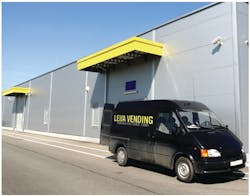As the old adage goes, it is better to be safe than sorry. Business owners should be prepared for the worst, especially in an industry where there are many liabilities. This means having the proper insurance coverage in the event of an accident or catastrophe. There are several coverage options that are critical for any vending operation to have, including property, liability and auto coverage.
Protect yourself, protect your business
General liability provides coverage to vending operators in the case of third-party accidents such as bodily harm if a vending machine falls on someone or if a consumer sues for improper labeling. Ted Devine, chief executive officer of Insureon reports that the majority of building owners and property managers are requiring operators to show proof of liability insurance.
Depending on the insurance provider, general liability can be labeled under another name, such as business liability. Property and liability coverage are oftentimes combined to create a “business owner’s policy” or BOP. “Instead of paying full price, operators can get a discount because they are buying both at once,” said Devine. “The BOP can also be customized with other types of coverages, like commercial auto.”
The second part of the business owner’s policy, property insurance coverage, is another necessary insurance to ensure main business aspects are covered. Property insurance protects the machines in case of weather damage or power failure. Devine also points out that if an operator is leasing a machine, property insurance will cover replacements in the event that it breaks down or becomes ruined.
However, not all insurance companies offer machine coverage in their standard BOPs. State Farm allows clients to purchase its business policy with the option to add ‘endorsements’. In the case of vending, operators can add an endorsement that would provide coverage to vending machines, at a $250 deductible.
Although many smaller businesses don’t choose this endorsement due to the price, Kelli Soto of Ralph Bettencourt State Farm says that it can be useful for a large vending operation with hundreds of machines. The business liability policy for State Farm covers liability for bodily injury and content, also known as business property. However, Soto noted that the liability policy for State Farm won’t necessarily cover the operator if a consumer gets sick from an item in a vending machine. Be sure to go through all of the possible liabilities with your insurance provider and ask if your current policy would cover certain lawsuits. Some companies’ general liability insurance will cover accidents such as a consumer having an allergic reaction to a mislabeled product, but not all companies offer this coverage in their business owner’s policy.
Commercial auto is necessary
Besides business liability and property coverage, insurance providers recommend operators obtain auto insurance. If an operator is using his or her own personal vehicle to make deliveries, then purchasing commercial auto insurance is necessary. Personal automobile coverage differs from commercial coverage and most providers have an exclusion in their personal auto policies for commercial operations. This means if you’re using your personal truck to make deliveries and you get into an accident, the claim could name your company, which isn’t listed under your personal auto insurance. “The good news is that it’s pretty easy to get a policy called Hired and Non-Owned Auto insurance (HNOA), which provides coverage for a personal vehicle, i.e., one that’s not owned by the business, used for business purposes,” said Devine. “The HNOA policy can often be added as a rider to a business owner’s policy.”
Soto at State Farm agrees that commercial auto insurance is critical for operators making deliveries. “We have high liability,” said Soto. “If an employee is driving a truck with the company’s logo on it and then rear-ends someone, that person might go after the company because they assume they make the “big bucks.” We do a $1 million single limit with high deductibles on auto policies. I suggest that for any business.”
Soto also suggests that operators enroll in the commercial liability umbrella, if they choose to go with State Farm. Although this policy is optional, it allows operators to house both the business liability and auto insurance under one policy and gives clients an extra amount of coverage starting from $1 million up to $10 million.
The fine print
Every vending company is different, and each company will have its own insurance priorities. No matter which insurance provider a company obtains, it is important to know the fine print of all coverage. Every operator can ask themselves, “Do I know my insurer’s procedures in the event of an company emergency? Do I have add-ons, endorsements or riders to my policies? Do I know specifically what my insurance covers?”
In the event of a weather or fire related catastrophe, some companies, like State Farm, will do replacement cost coverage rather than actual cash value. “If your building burned down to the ground, how much would it cost to replace everything that was in it?” asked Soto. “I leave it up to the business owner to tell me what they want to ensure for. You can go as low as $5,000 and you can go as high as $150,000 or higher.” However, not all insurance companies have the same process when it comes to handling accidents and it is the operator’s responsibility to make sure he or she is covered.
Many times, operators don’t know the fine print of their coverage, and that includes the possibility of being over-insured.
Don’t cut corners
Some insurance companies give clients a policy with coverage that may never be used, while other companies offer a standard policy with the option of purchasing additional coverages that tailor the policy to each client’s needs such as the endorsements or riders previously listed.
One of the biggest mistakes Soto sees is when operators come to her for insurance simply because another business is requiring they have it, not because they believe they may actually need it. “They’ll get the minimum policy and they don’t want to go out of pocket for anything more than the minimum that they have to purchase. Then something like a water line breaks or someone steals their vending machine. Then I have to explain to them that their policy doesn’t cover those instances. That’s the most difficult conversation to have with clients, when they decide to cut corners not pay premiums and then they need help that we can’t provide.”
Other recommendations
There are many types of insurance for business owners, and there is a realization that not every business owner can afford each type of insurance. Although property coverage, liability coverage and automobile coverage are the most common and necessary types of business insurance, there are several other types that are recommended. Disability insurance, health insurance, life insurance and workers’ compensation are a few other recommended coverage options operators should look into.
Soto and Devine both recommend that operators think of the worst possible scenario for their business: a company partner dies, a child has an allergic reaction to a mislabeled homemade product in a machine, a broken water line floods a building floor. Are you fully covered? If the answer is ‘no’ or ‘I’m not sure,’ it’s time to speak with your agent.
Readers can visit www.insureon.com or www.ralphbettencourt.com for more information or to speak with an agent.
Insuring secure credit card data
One type of insurance coverage that operators need to take into consideration is cyber liability insurance. If a machine accepts credit cards, the machine’s operator is responsible for maintaining customers’ credit card information in a safe and secure way. “Skimmers that are on ATMs can also be put on vending machines,” said Ted Devine, chief executive officer of Insureon. “A person can swipe their card thinking they’re using the machine’s credit-payment option, but then their data can get transferred to a cybercriminal somewhere. When the cops track down the source of the data breach to your vending machine, you could be on the hook for providing credit monitoring services, paying state fines and more.” At Insureon, cyber liability insurance can be added on as part of the business owner’s policy.
5 mistakes vendors make with insurance
When it comes to choosing insurance, mistakes are common. Ted Devine, chief executive officer of Insureon, lists the most common insurance mistakes vending operators make:
- Not insuring the vending machine, especially if it’s leased. You may only be contractually required to have general liability insurance, but adding property is pretty easy and affordable, and it can save a lot of money and hassle in the event of damage to the machine.
- Not disclosing all of the products you sell in your machine to your insurance provider. Cigarette vendors and hot beverage vendors have vastly different exposures than candy vendors. If the foods you sell can spoil, there might be some additional liabilities. It’s just really important to disclose all the products sold in your machines. Otherwise, if you have to make a claim and it turns out your policy doesn’t cover incidents related to that product, you’re on your own to cover the costs.
- Not monitoring and maintaining machines. We all know the saying “a stitch in time saves nine,” and it’s so true with machine maintenance – just like car maintenance. A little upkeep can prevent a lot of expensive breakdowns.
- Not contacting the insurance provider right away when a claim incident or potential claim incident happens. It’s important to remember that you don’t have to wait for a lawsuit to contact your insurance company. The minute you hear that your machine fell on someone, it’s smart to give your insurance provider a call. The truth is that most people won’t sue over these types of incidents, but when someone does, it’s going to be a lot harder to convince your insurance provider to cover the claim if the triggering incident happened three months ago and they never heard about it.
- Choosing a deductible that’s too high. It can be tempting to go with a higher-deductible policy because those policies usually come with lower premiums each month. But if you can’t comfortably afford your deductible in the event an incident occurs, you’re going to be financially strapped even though you have insurance coverage. The deductible shouldn’t be more than you can afford – period. To determine what that amount is, talk to your agent.
About the Author

Adrienne Klein
Contributing Editor
Adrienne Zimmer Klein is a freelance writer with a background in the vending, micro market and office coffee service industry. She worked as an associate editor and managing editor at Automatic Merchandiser and VendingMarketWatch.com from 2013 until 2017. She is a regular contributing writer at Automatic Merchandiser.
